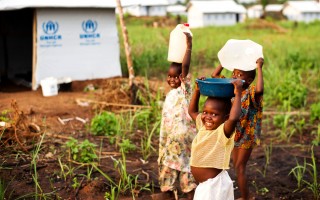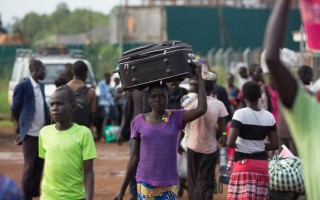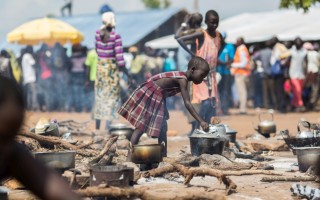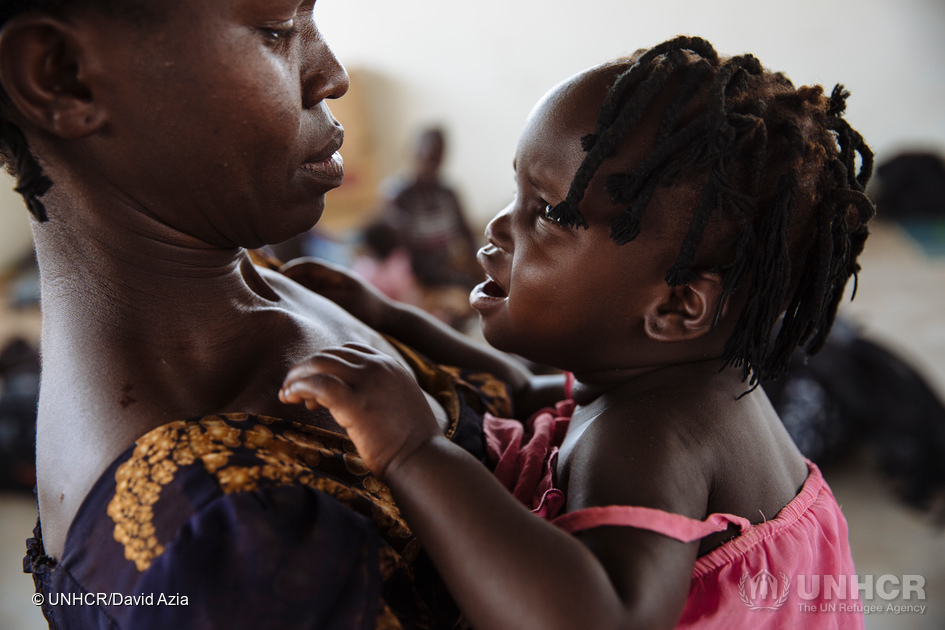
Opani Lilias, 28, holds her only child Brenda, 21 months, following an interview with UNHCR in a storage building in Uganda.
When Opani Lilias was met by UNHCR aid workers at the Ugandan border, she had been walking for a week straight with her daughter Brenda swaddled to her chest.
Carrying only a small suitcase, Opani and Brenda arrived exhausted, having travelled without food or water, surviving only on wild grains they found along their way. At night they slept out in the open, under trees, with Opani always keeping “one eye open” to guard Brenda from snakes and anything else that might be lurking in the night. During the journey Brenda became sick with a fever, and the soles of Opani’s shoes had completely worn through.
The long journey from South Sudan through the Democratic Republic of Congo to the Ugandan border is difficult and dangerous. However as Opani explained, “There is no other way. You have to be strong.”
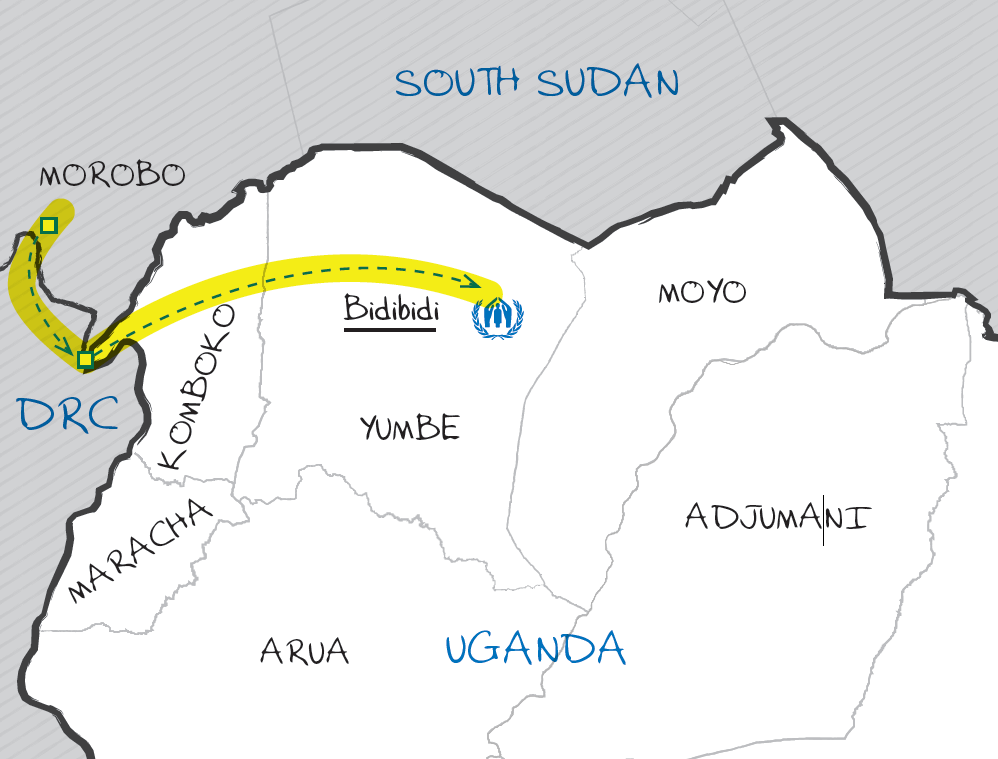
The route Opani and Brenda travelled, from their home in Morobo to the settlement camp in Bidibidi.
“I’LL LOSE MY LIFE IF I CONTINUE STAYING HERE”
Back in their home city of Morobo in South Sudan, Opani, who speaks fluent English, had worked as a customs official. Fighting broke out near her home and Opani was terrified to hear reports of roaming militias who went from home to home “slaughtering” those that they found.
She fled with her daughter to a neighbouring village to find safety and be with her grandfather. But it wasn’t long before the violence spread there too, and Opani made the choice to flee to Uganda to try and save Brenda and herself. Her grandfather, unable to make the journey due to his age, insisted that she leave him behind.
“I left my home because of the war. They move from home to home. If they find you,they will kill you. They slaughter you, it’s not even killing –slaughtering.They slaughter human beings like an animal, like a cow. That’s why I decide…enough is enough. Otherwise I’ll lose my life if I continue staying here.”
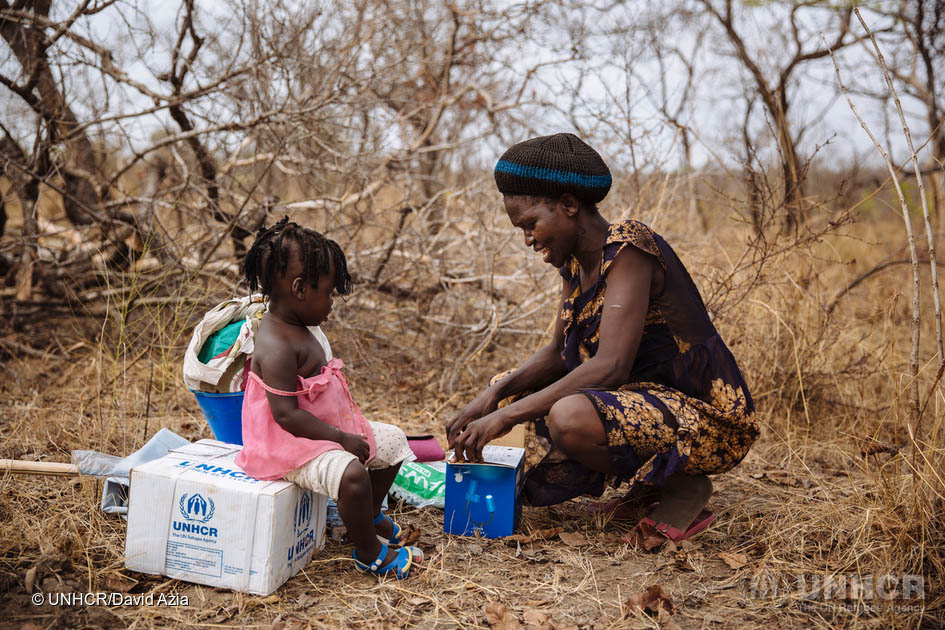
Opani unpacks a combined solar lamp and mobile phone charger as Brenda sits on a box of kitchen utensils, part of the Core Relief Items with which they were provided.
When they finally arrived in Uganda, UNHCR aid workers transported Opani and Brenda to Bidibidi refugee settlement, a sprawling refugee camp with over 270,000 refugees. There, they received food, water, mats, and blankets as well as a spot in the communal dormitories.
“When I reached at the border I just laughed. I didn’t think that I could reach it on foot without eating or taking water. But when I reached the border and I saw your colleagues working there, when they welcomed us, I was very happy. I said, ‘I am now safe, I will not die and I will not be slaughtered.’”
“Right now, where I can sleep is my first priority. Second–food,” says Opani. During their first night in the dormitory, her daughter Brenda had difficulty sleeping on the hard floor. But after enduring so much, Opani was happy just to be alive with her daughter safely by her side.
A GROWING CRISIS
As the South Sudan conflict continues, an unprecedented and unrelenting number of families is arriving daily at the Ugandan border. Reception centres are becoming dangerously overcrowded and vital services within the settlement are at breaking point.
Opani is just one of a staggering 1.9 million refugees and asylum seekers from South Sudan. The majority of these refugees are women and children, just like Opani and Brenda.
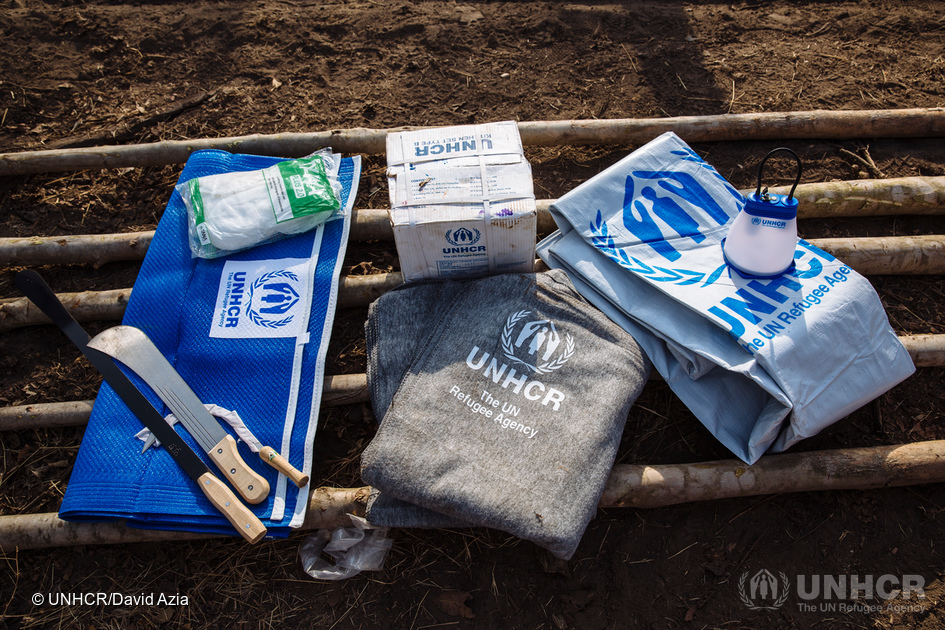
Core Relief Items provided to South Sudanese refugee Opani Lilias are arranged on the ground at their newly assigned plot in Arua District, Northern Region, Uganda.
SHELTER AND SANCTUARY IN BIDIBIDI
After arriving at Bidibidi refugee camp, Opani received a UNHCR Emergency Shelter Kit, comprising of sleeping mats, blankets, jerry cans, soap, a mosquito net, kitchen utensils, tarpaulin, a solar lantern and mobile phone charger, and a grass cutter, machete and sickle to chop wood and clear land, This kit contains all the essentials that South Sudanese refugees need to have shelter and to care for their family.
After receiving this kit, Opani moved with Brenda to their own designated plot of land in the settlement. The Ugandan government, as a part of its generous refugee resettlement policy, provides plots of land to newly arrived refugees, allowing them to build their own homes and grow food that can be sold for additional income. Having left all her belongings in her previous home in South Sudan, including the family’s farm animals, this land will provide Opani and Brenda with the opportunity to maintain a semblance of their normal life.
It is not clear when the fighting in South Sudan will end, or Opani and Brenda may be able to return home. But for now, Opani’s main priority is to ensure that Brenda receives a good education and grows up in peace and safety.
You can provide South Sudanese refugees like Opani and Brenda with the life-saving support they need.

